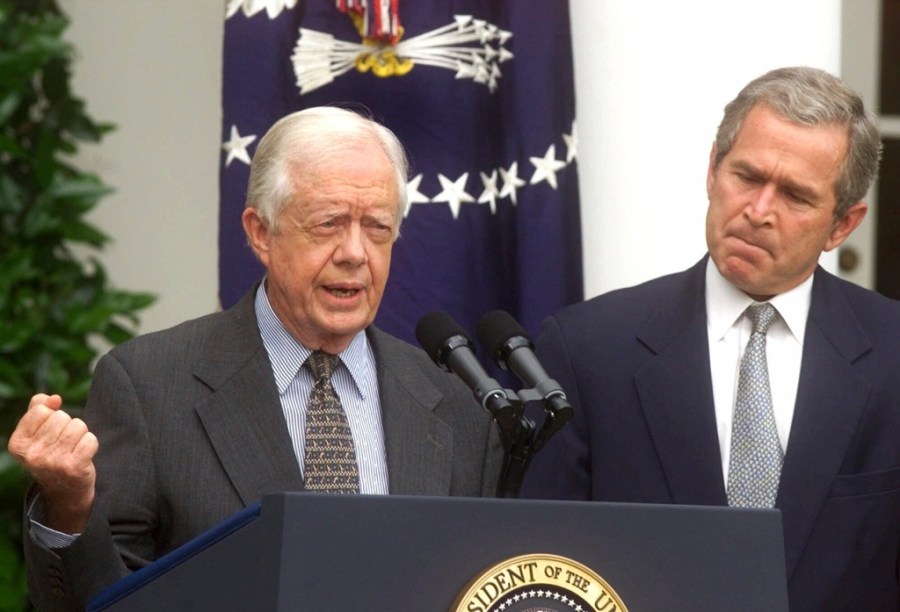
The connection is not at all obvious between Jimmy Carter’s presidency and the investigation of the 2016 election that was sharply critical of the FBI’s role in it and how it may have wrongly harmed Donald Trump.
The official Department of Justice report that concluded that “that senior FBI employees would be willing to take official action to impact a presidential candidate’s electoral prospects to be deeply troubling and antithetical to the core values of the FBI and the Department of Justice.” And this report never would never have been issued, absent a Carter initiative — the Inspector General Act of 1978.
Through that law, Carter introduced a system that now includes 70 officials charged with reviewing the actions of specific agencies and issuing probing reports. There were, in other words, no inspectors general or “IGs” — including Justice Department IG Michael Horowitz — before Carter.
The idea that a department insider would be looking over the shoulders of employees and would routinely be critical should be appreciated as a deeply American innovation. One cannot imagine this happening in China, where it is certainly needed.
Yet thanks to Carter, Americans take for granted the idea that an outsider-insider observer should have access to the details of actions taken by departments to which they are assigned in order to “promote economy and efficiency” and ferret out “waste, fraud and abuse.” Recent IG reports found at Oversight.Gov include those on pandemic IRS tax credit fraud, the “performance challenges” of the Department of Homeland Security and such nitty-gritty reviews as that of travel expenses at the Nuclear Regulatory Commission.
Who knew that Carter anticipated Elon Musk and Vivek Ramaswamy?
The IG system, moreover, is just one example of Carter’s focus on the details of government operations — reflecting what is often derided as a technocrat’s belief that improved systems will improve government. It’s a world view associated with “goo-goos” — the good government progressives historically derided as naïve by big city bosses.
Carter was a goo-goo, to a fault, believing that specific policy areas should have their own Cabinet agencies, overlooking the likelihood that they would create more red tape and seek increasing roles (aka mission creep). That led to the departments of Energy and of Education — the latter now a Trump target, his having noticed that educational achievement has not improved since the advent of the department (although it does well measuring the decline).
But even goo-goos are right sometimes. Just as the Inspector General system was an important improvement, so too was Carter’s idea that it’s important to attract the capable and talented to key government leadership roles by paying them competitive salaries and ensuring their hiring based on merit. The result was the Senior Executive Service, established by the Civil Service Reform Act of 1978 to create a thin layer (some 8,000 today) of nonpolitical agency leaders charged with effectively implementing the ideas of the political appointees — not their own ideas but the ideas of those appointed by the president.
It is facile to describe such officials as creatures of the swamp. But a list of “SES” positions currently advertised on USA Jobs reminds us that there are a great many government roles for which the public expects and demands competent officials. They include Deputy Director of the National Transportation Safety Board; FEMA director for Washington, D.C.; Chief Artificial Intelligence Officer for the Department of Transportation and Chief Technology Officer for the Treasury’s Financial Crimes Enforcement Network.
There are other positions that might not seem as attractive, such as that of an IRS procurement officer. But even as the incoming administration readies as scalpel for the federal government, such positions remind us that there is actually little controversy about a great many government agencies — from airline and food safety to disaster response. Indeed, Americans tend to take their competence for granted.
Carter didn’t — and it was that concern that led to the Inspectors General and the Senior Executive Service.
It is altogether healthy for the country to debate which functions are appropriate for government. But it’s crucial to keep in mind that there are a great many functions about which there is no debate, nor should there be.
We want an FBI that can ferret out terrorists before they strike. We want an FAA that can keep the planes running on time. To the extent they do so — not always as well as they should — Jimmy Carter, whatever his flaws and limitations, deserves some credit.
Howard Husock is a senior fellow at the American Enterprise Institute.












